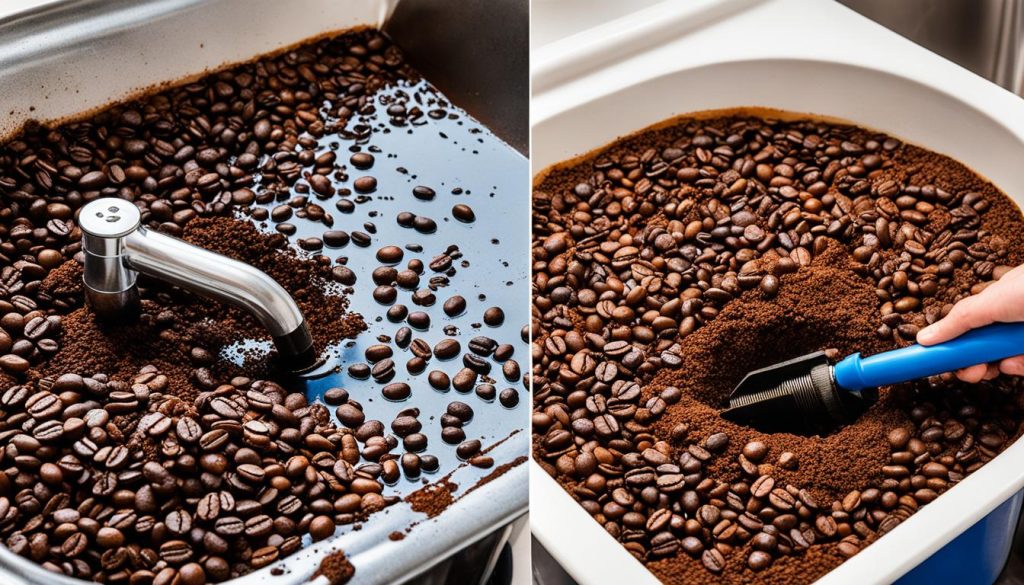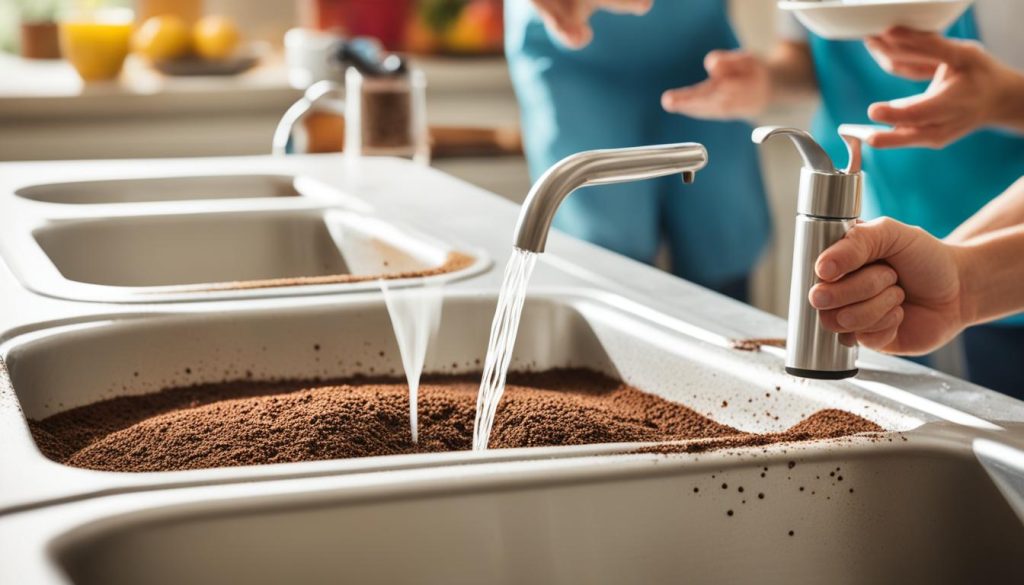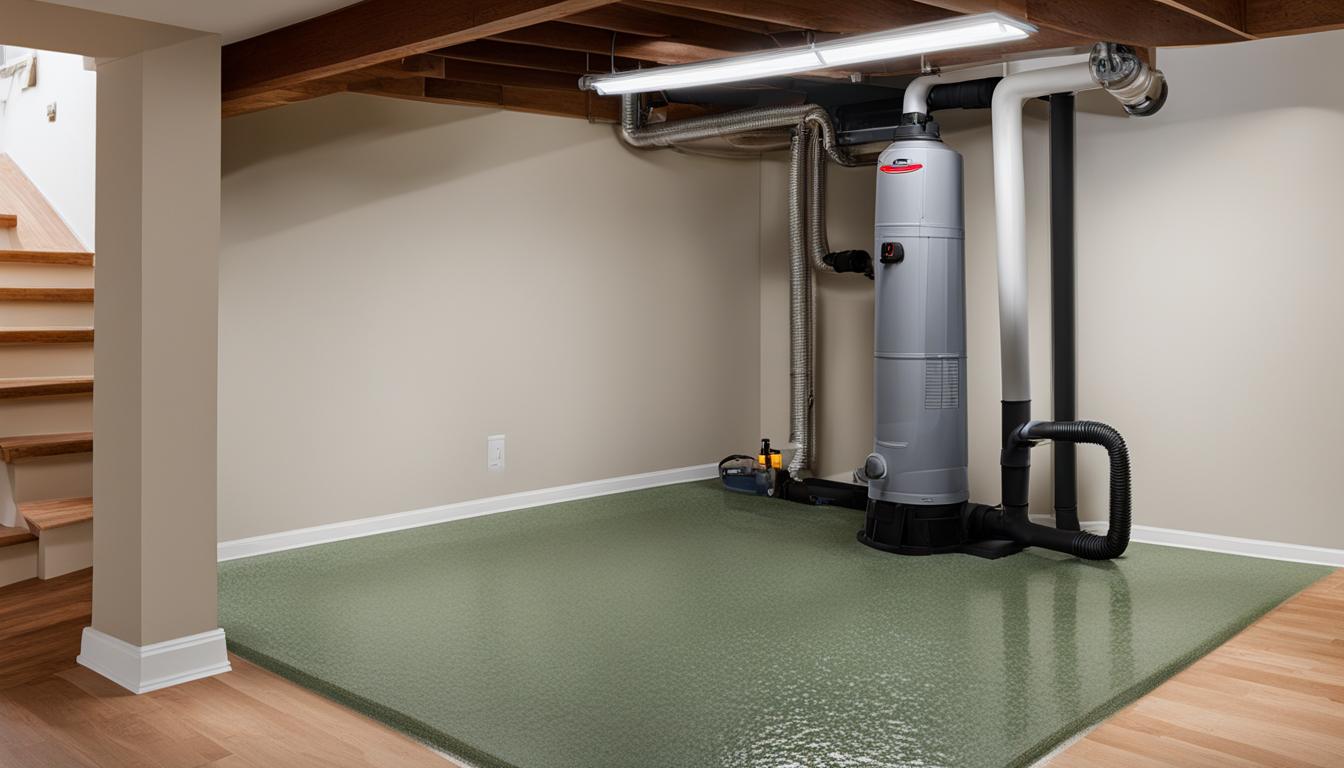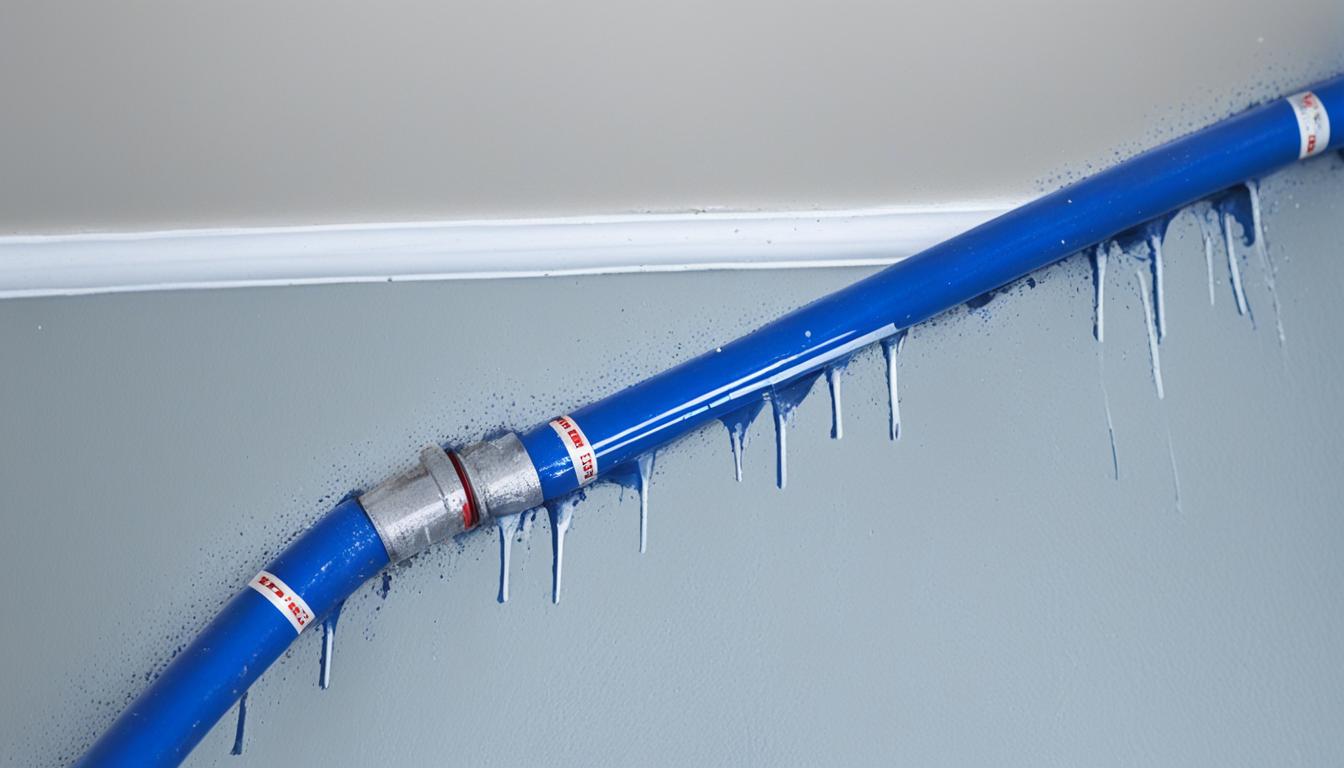Unclog Drains: Dissolve Coffee Grounds Effectively
Did you know that coffee grounds can lead to clogs in drains and cause unpleasant odors and backups? It’s true! The accumulation of coffee grounds in pipes can be a significant issue that affects the proper functioning of your drains. But don’t worry, there are effective methods for dissolving and removing coffee grounds from drains, helping you avoid clogs and keep your plumbing system running smoothly.
Key Takeaways:
- Proper disposal of coffee grounds is essential to prevent clogs in drains.
- Coffee grounds should never be rinsed down the sink or garbage disposal.
- There are eco-friendly ways to dispose of coffee grounds, such as using them as fertilizer or repelling pests.
- Natural methods like baking soda and vinegar can help dissolve coffee grounds in drains.
- Regular maintenance and preventive measures can help avoid coffee grounds buildup and clogs.
Why Coffee Grounds Shouldn’t Go Down the Drain
When it comes to disposing of coffee grounds, it’s important to avoid putting them down the sink or garbage disposal. While it may seem convenient to rinse them away, doing so can lead to serious drain clogs over time.
When coffee grounds are rinsed down the drain, they can accumulate and form blockages. This is because coffee grounds are partially soluble and can stick to the sides of pipes, creating a buildup that restricts water flow.
If left untreated, these coffee ground clogs can cause slow drainage, foul odors, and even completely block the drain. This can be both inconvenient and costly to fix.
To prevent such issues, it’s crucial to properly dispose of coffee grounds instead of rinsing them down the drain. By taking a few simple steps, you can avoid clogs and keep your drains functioning properly.
The Impact of Coffee Grounds in Drain
When coffee grounds are disposed of in the drain, they can accumulate over time and lead to blockages. The partially soluble nature of coffee grounds allows them to cling to the sides of pipes, creating a sticky residue that builds up and narrows the passage for water to flow through.
As coffee grounds build up in the drain, they can catch other debris and hair, exacerbating the clog. This can result in slow-draining water, foul odors, and even complete blockages that require professional intervention.
Additionally, the accumulation of coffee grounds in the drain can lead to bacterial growth and unpleasant smells. The moist environment provides an ideal breeding ground for bacteria, which can further contribute to clogs and affect the overall hygiene of your kitchen or bathroom.
By avoiding the disposal of coffee grounds in the drain, you can prevent these issues and maintain the proper functioning of your plumbing system.
How to Properly Dispose of Coffee Grounds
When it comes to disposing of coffee grounds, it’s important to do so in a manner that is both eco-friendly and safe for your drains. Improper disposal of coffee grounds can lead to clogs and buildup in your pipes, causing potential plumbing issues down the line. Fortunately, there are several effective methods for the proper disposal of coffee grounds.
1. Use coffee grounds as fertilizer
One eco-friendly way to dispose of coffee grounds is by using them as a natural fertilizer for your plants. Coffee grounds are rich in nutrients such as nitrogen, potassium, and phosphorus, which can benefit the growth and health of your garden.
Simply add the coffee grounds directly to your garden soil or compost pile. As coffee grounds break down, they release these valuable nutrients, providing your plants with a nourishing boost.
2. Repurpose coffee grounds
Aside from being a great fertilizer, coffee grounds can also serve a variety of other purposes around your home and garden.
- Use coffee grounds as mulch for plants with shallow root systems, such as blueberries or azaleas. The grounds can help conserve moisture, regulate soil temperature, and even deter pests.
- Make your own natural body scrub by combining coffee grounds with coconut oil or sugar. This exfoliating scrub can leave your skin feeling rejuvenated and smooth.
- Repel ants and squirrels by sprinkling coffee grounds near the entry points of your home or garden. The scent of coffee can deter these pests effectively.
- If you have issues with cats using your garden as a litter box, coffee grounds can help. Spread coffee grounds around the areas where cats tend to visit, as the strong smell can deter them.
3. Donate used coffee grounds
Another option for coffee grounds disposal is to donate them to local community gardens or farms. Many organizations and individuals use coffee grounds as a natural soil amendment to enhance plant growth and soil health. Check with your local gardening or farming community to see if they accept used coffee grounds.
4. Compost coffee grounds
If you have a compost pile or bin, coffee grounds can be a valuable addition. They contribute to the overall nutrient content of your compost and help create a rich, fertile soil amendment. Be sure to mix the coffee grounds well with other compostable materials to ensure proper decomposition.
Remember, whatever method you choose, it’s essential to prevent coffee grounds from accumulating in your drains. Taking proactive steps to dispose of coffee grounds properly can help you avoid the inconvenience and expense of dealing with drain clogs.
Removing Coffee Grounds from Drains
When it comes to removing coffee grounds from drains, there are a few safe and effective methods you can try. These methods utilize common household ingredients and can help dissolve the coffee grounds without causing damage to your pipes or producing harmful fumes.
Method 1: Baking Soda and Vinegar
One popular method involves using a combination of baking soda and vinegar to break down the oils and fibers in the coffee grounds. Here’s how to do it:
- Start by pouring half a cup of baking soda down the drain.
- Follow it up with half a cup of vinegar.
- Let the mixture sit for about 15 minutes to allow it to work on the coffee grounds.
- Finally, flush the drain with hot water to help wash away the dissolved coffee grounds.
Method 2: Hot Water and Soap
If you don’t have baking soda or vinegar on hand, you can use hot water and soap to dissolve the oils in the coffee grounds. Here’s what you need to do:
- Boil a kettle or pot of water.
- While the water is boiling, add a few drops of dish soap to the drain.
- Once the water is boiling, carefully pour it down the drain.
- Allow the hot water and soap to work on the coffee grounds for a few minutes.
- Finish by flushing the drain with more hot water to wash away the dissolved coffee grounds.
It’s important to note that you should avoid using chemical drain cleaners to remove coffee grounds from drains. These cleaners can be harsh on your pipes and may cause damage over time. Stick with these natural and safe methods instead.
By following one of these methods, you can effectively dissolve and remove coffee grounds from your drain, preventing clogs and maintaining the proper functioning of your plumbing system.
Avoiding Coffee Grounds Buildup in Drains
To prevent coffee grounds from causing clogs in drains, it is important to properly dispose of them as mentioned earlier. Additionally, you can use a mesh screen or drain cover to catch any coffee grounds that may accidentally go down the sink. Regularly cleaning your coffee maker can also help prevent buildup of oils and residue that can contribute to clogs. By following these preventive measures, you can avoid coffee grounds buildup in drains and keep your plumbing system running smoothly.
Preventing Coffee Grounds Clogs
Here are some tips for preventing coffee grounds clogs:
- Proper disposal: As mentioned in section 3, avoid rinsing coffee grounds down the sink. Instead, dispose of them in an eco-friendly way, such as using them as fertilizer or mulch.
- Mesh screen or drain cover: Install a mesh screen or drain cover over your sink drain to catch any coffee grounds that may accidentally go down. This simple device can help prevent clogs and keep your drains clear.
- Clean coffee maker: Regularly clean your coffee maker to prevent the buildup of oils and residue. Follow the manufacturer’s instructions for cleaning or use a mixture of vinegar and water for a natural cleaning solution.
By implementing these tips, you can effectively prevent coffee grounds buildup in drains and avoid the hassle of dealing with clogs.
Your solution to avoid Clogs from Coffee Grounds in Drain
Another way to avoid clogs from coffee grounds in the drain is to repurpose your coffee grounds for gardening purposes. Coffee grounds contain nutrients that can benefit plants and help them grow. By adding coffee grounds directly to garden soil or compost pile, you can prevent clogs and contribute to a healthy garden ecosystem.
Additionally, you can use coffee grounds as a natural cleaner and deodorizer. Coffee grounds can help absorb odors in your kitchen or refrigerator. Simply place a bowl of coffee grounds in areas where odors are present, and let them work their magic.
Remember to always dispose of coffee grounds properly and avoid rinsing them down the drain. By following these tips, you can prevent coffee grounds clogs and maintain a healthy plumbing system.
DIY Methods for Clearing Coffee Grounds Clogs
If you find yourself dealing with a clog caused by coffee grounds in your drain, don’t fret! There are several DIY methods you can try before calling a professional plumber. These methods are not only effective but also cost-efficient, allowing you to tackle the issue on your own. Here are some DIY methods for clearing coffee grounds clogs:
1. Using a Plunger
One of the simplest and most common methods for clearing clogs is using a plunger. By creating a strong suction, plungers help dislodge the clog and restore proper drainage. To use a plunger:
- Place the plunger directly over the drain.
- Ensure the plunger covers the entire drain opening.
- Apply firm, downward pressure and vigorously plunge up and down for about 20 to 30 seconds.
- Repeat the process a few times if necessary, until the clog is cleared.
2. Snaking the Drain
If the plunger doesn’t do the trick, you can try snaking the drain with a drain snake or an auger. Snaking the drain involves inserting a long, flexible wire into the drain to break up and remove the clog. Here’s how to snake the drain:
- Insert the tip of the drain snake into the drain opening.
- Gently push the snake further into the drain, rotating it clockwise as you go.
- Continue pushing and rotating the snake until you feel resistance.
- Once you’ve encountered resistance, retract the snake while continuing to rotate it.
- Repeat the process a few times, gradually working the snake deeper into the drain.
- After clearing the clog, flush the drain with hot water to remove any remaining coffee grounds.
It’s important to exercise caution and follow instructions carefully when using a drain snake to avoid damaging your pipes.
These DIY methods for clearing coffee grounds clogs can help you restore the proper functioning of your drains without the need for a professional plumber. However, if you’re unsure or uncomfortable attempting these methods on your own, it’s always best to consult a professional for assistance.
Remember, prevention is key to avoiding future clogs caused by coffee grounds. Properly disposing of coffee grounds and regularly maintaining your drains can help you avoid unnecessary headaches and expenses. Now, let’s move on to the next section to learn more about when it’s time to call a professional plumber.
When to Call a Professional
If you’ve tried DIY methods to clear a coffee grounds clog in your drain without success or if you’re dealing with a severe blockage, it may be time to call a professional plumber. Signs of a serious drain issue include water backing up out of the sink drain, slow-draining water, and foul odors coming from the drain. A professional plumber has the necessary tools and expertise to effectively clear the clog and ensure the proper functioning of your drain.
Signs That It’s Time to Call a Professional Plumber
- Water backing up out of the sink drain
- Slow-draining water
- Foul odors coming from the drain
When you notice any of these signs, it’s important to address the issue promptly to prevent further damage and potential plumbing emergencies. Calling a professional plumber who specializes in drain cleaning services can save you time, effort, and potential headaches.
Professional plumbers have the expertise to diagnose the root cause of the clog and utilize the most appropriate methods and tools to clear it. They have access to high-powered equipment, such as drain snakes and hydro-jetting systems, which can effectively remove severe coffee grounds clogs and other blockages.
By enlisting the services of a professional plumber, you can have peace of mind knowing that your drain will be thoroughly cleaned and restored to optimal functioning. This can prevent future clogs and ensure the longevity of your plumbing system.
| Benefits of Professional Drain Cleaning Services |
|---|
| Effective removal of severe coffee grounds clogs |
| Prevention of future clogs and backups |
| Expert diagnosis and solutions for drain issues |
| Utilization of advanced drain cleaning equipment |
| Save time and effort |
Conclusion
Proper disposal of coffee grounds and regular maintenance of your drains can help prevent clogs caused by coffee grounds. By using eco-friendly methods to dispose of coffee grounds and following the tips mentioned in this article, you can keep your drains clear and avoid costly plumbing issues.
If you do encounter a coffee grounds clog, there are DIY methods you can try, but it is always advisable to seek professional help for severe clogs. With the right approach, you can dissolve coffee grounds effectively and keep your drains running smoothly.
Remember to never pour coffee grounds down the drain, as this can lead to blockages and potential damage to your plumbing system. Instead, dispose of them properly by using them as fertilizer for your plants or for other creative purposes. With these preventive measures and effective solutions, you can say goodbye to clogs caused by coffee grounds and enjoy hassle-free drainage in your kitchen.
- Investing Wisely: How Windows & Doors in Boost Property Value and Financial Health - April 24, 2025
- The Financial Impact of Personal Injuries: Why Legal Help Matters for Business Owners - April 16, 2025
- The Hidden Financial Costs of Domestic Assault: What Business Owners Need to Know - April 16, 2025














